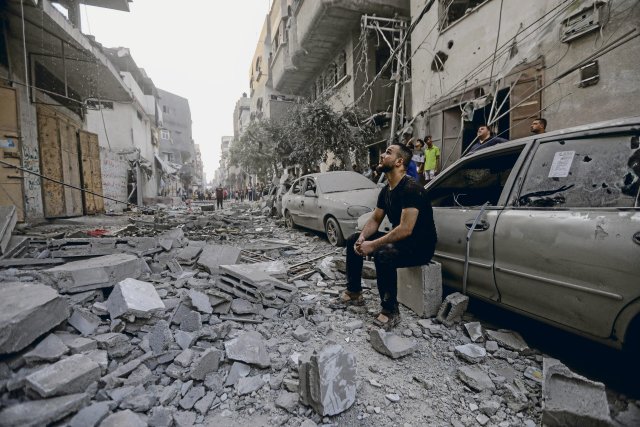Who will rebuild it? And who will heal the wounds?
Photo: IMAGO/Mahmoud Ajjour
Another book about October 7th last year, the massacre of Jewish civilians in Israel, has been published, and a number of other publications will follow. The author, Ron Leshem, born in 1976, is a liberal, self-described “Middle Eastern-born gay man.” The novelist and screenwriter was also once an Israeli intelligence officer. He has been living in Boston for ten years because he doesn’t trust peace in Israel.
October 7 terribly confirmed his pessimism (or his realism). Leshem is personally affected. Hamas murdered his uncle and aunt in a kibbutz, kidnapped his cousin, who was also a German citizen, hostage and killed him too. Kibbutzes were once considered a symbol of solidarity, peace and international understanding.
nd.DieWoche – our weekly newsletter

With our weekly newsletter nd.DieWoche look at the most important topics of the week and read them Highlights our Saturday edition on Friday. Get your free subscription here.
The author describes the most gruesome details right at the beginning of his book, later in more detail in a chapter entitled “Chronicle of a Day”. Torture images. Apocalyptic slaughter. Sacrificial rituals. Man uninhibited and wild in wolf form. These notes are almost unbearable, shocking and deeply disturbing. Massacre under the curse of a religion.
More than a thousand dead, horribly mauled, 240 hostages kidnapped. The attack happened as planned on Shabbat. “The aim of terror,” writes Leshem, “is always to destroy our faith in human nature.” Hamas’s long-term goal: a multi-front war with Lebanon, Iran, the Arab League and the Palestinians within Israel. “Such an attack was intended,” writes Leshem, “to awaken the monsters in all of us and make an entire people want death and revenge.”
The most revealing chapter in Leshem’s book is, tellingly, entitled “Civil War.” At around ninety pages, it is the longest and takes up almost a third of the book. In it, Leshem characterizes the different population groups in Israel.
There are the messianists, the national religious, today’s right-wing extremist settler movement, which uses armed force to defend and expand its sphere of influence. They demand that democracy must be subject to God’s commandment. In left-wing circles, “religious people were viewed as a fundamentalist group,” writes Leshem, “that threatened to destroy Israel by turning the country into a religious apartheid state that separated itself from the West.”
Then there are the Charedim, the God-fearing people, the part of the population with the greatest demographic growth, today almost 13 percent of the population, in twenty-five years it is expected to be 21 percent. They see, “according to their own understanding,” their task as “looting the public coffers in the interests of their own electorate.” A large number of these ultra-Orthodox Jews “do not work and live on state aid,” writes Leshem. They are motivated by “Jewish feelings of superiority” and they would also try to “implement apartheid solutions.”
Prime Minister Benjamin Netanyahu, who has been accused on several occasions, is also not neglected in Leshem’s criticism. The author also expresses the “suspicion that Netanyahu’s “bibists” would rather prolong the war, because as long as it lasts, their failure and the criminal proceedings against Netanyahu will not be addressed. The war progresses without any goal or plan. But what should happen the day after?”
In his book, Leshem tries to do justice to both sides, the Israelis and the Palestinians. He actually manages to give a balanced portrayal of the tricky and hateful situation. The author looks back at the founding of Israel in 1948, outlines “the history of the conflict,” and explores where the “name Palestine” comes from, namely from “Philistines, apparently a people of seafarers from the Greek region who came to Israel in 604 BC. was wiped out”. Leshem then talks about “year zero in the cycle of violence, the origin where everything began.” He places this in the 1920s.
The author compares the different views of history from both sides and lets the reader see how anger and hatred are each generated and justified. He names the “beginning of the Palestinian catastrophe,” which many Israelis do not recognize because they believe it “endangers our right to exist.” The war that followed Israel’s founding ended in the 1949 Rhodes Armistice Agreement, an agreement with neighbors Egypt, Jordan, Syria and Lebanon. The borders stipulated therein were recognized “by the majority of states” worldwide, “even by most of the Arab states.” But Leshem also notes that “at the same time, the Israelis were given the responsibility” to recognize the loss and pain that the Palestinians suffered with their uprooting, which “only made it possible for Israel to declare itself a democratic state and a Jewish homeland in 1948 found”.
Today, Iran is primarily interested in explosions in the region, and Hamas is an accomplice. Netanyahu’s right-wing radical government is fueling the conflict. How should we find a way out of this bloodthirsty situation?
The situation is desperate, Leshem admits. His book is not just about the war, “but also about the torn, sick state in which Israel found itself on the eve of October 7th, and the way in which the massacre has fundamentally changed and will continue to change the country becomes”. And not just this state. In the USA, in his adopted homeland, he is registering worrying hatred of Jews, especially among young people. Disinformation campaigns on the Internet are flourishing at an abysmal level.
Leshem says that writing is a comfort to him. His wishes and visions in the last chapter under the heading “A Blueprint for Hope, for Peace” sound unreal and desperate in their helplessness of an intellectual. Leshem himself remarks at the beginning of the book: “We are so similar to each other, the Israeli fate and the Palestinian fate are so intertwined that one can speak of one and the same, albeit deeply divided personality.” Hence, last but not least, his desperate attempt to to offer solutions.
A human tragedy of biblical proportions is to be lamented. Religions that are not peacemakers but rather warmongers are also to blame. Ron Leshem has written a moving and profound book, extensively researched and seeking justice. No one who is concerned with current events in the Middle East will be able to ignore this book, which is brilliantly written and translated.
Ron Leshem: Fire. Israel and October 7th. A.d. Hebrew v. Ulrike Harnisch and Markus Lemke. Rowohlt, 320 p., hardcover, €25.
